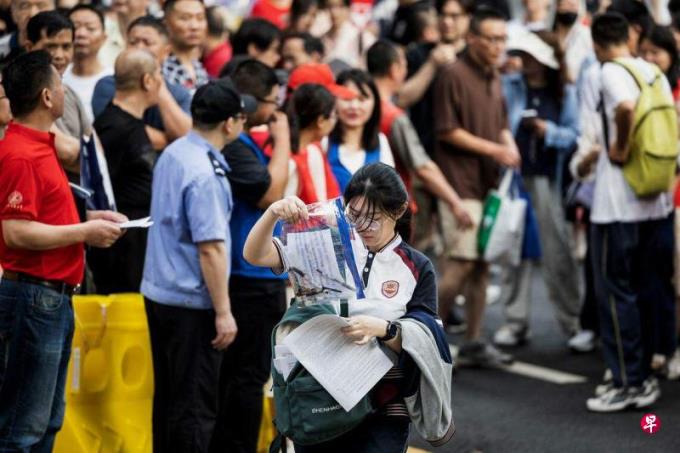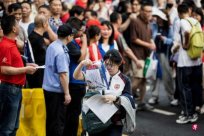
How should the government plan the scale of college enrollment?I do n’t have a very reliable argument, but it is estimated that it is more appropriate between 4 million and 5 million (the scale of the master's and doctoral students is adjusted), and the current enrollment scale is too large.
Last year, a Chinese official self -media called on college students to take off Kong Yiji's gown, which caused heated discussions, and most of the critics.For college students, they invested more education costs, but did not get corresponding income, so they were dissatisfied, which is common sense.But the reality is that there are more and more college students, and the good positions are very limited. College students have to reduce their expectations, put down their bodies, and be forced to roll.In fact, the two views should be conflicts with the facts, and there are no simple or wrong.The so -called internal rolls are relatively standardized that the margin of labor income is diminished.In daily words, from one point of labor, to harvest in two points, to one penny for two points, and to a three -pointer to harvest ... This is the inner volume.
What is worth thinking about is, what causes the internal volume of college students to be serious?Of course, there are many reasons, but the excessive expansion of universities is an important reason.In 1990, the National University Admissions (including a specialist, the same below) 610,000, 1.08 million in 1998, and 1.6 million in 1999 (1999 was known as the expansion of colleges and universities, the number of enrollment was 520,000, the expansion ratio was 48%), 5.04 million in 2005(This year exceeded 5 million), 6.57 million in 2010, 7 million in 2015, 9.68 million in 2020, 10.14 million in 2022.If the average age of students participating in the college entrance examination is considered 19 years old (then the average birth year for the college entrance examination in 1990 is 1971, and the rest of the class is pushed), it can be seen that the university net entry rate of the above year is: 2.4%, 6.2%, 8.9%, and 8.9%.20.9%, 29.1%, 33.9%, 56.9%, 63.4%.Since more than 50%in 2020, the ratio has continued to rise (at the same time, the enrollment scale and net enrollment rate of master and doctoral students have continued to expand).At present, the enrollment capacity of Chinese universities is more than 10 million, and the number of births has dropped to less than 10 million.This means that after more than 10 years, even if the net incoming rate of university is 100%, the students are still insufficient.It can be seen that college students are indeed increasingly "golden".Therefore, college students have to reduce employment expectations.
The question is: Does this society need so many college students?
Chinese universities are almost planned, that is, universities must formulate enrollment plans, and then approve the corresponding education authority.Before 2000, the scale of college enrollment was indeed too small, so it should indeed be expanded.How should the government plan the scale of college enrollment?I do n’t have a very reliable argument, but it is estimated that it is more appropriate between 4 million and 5 million (the scale of the master's and doctoral students is adjusted), and the current enrollment scale is too large.
Excessive expansion causes various social effects
The redundancy of academic qualifications is one of the social effects of excessive expansion of colleges and universities.The requirements of the same position on the degree of education are getting higher and higher, and many of them do not need such a high degree at all, leading to redundant education.For example, some universities even doctoral doctors have to be Ph.D., but undergraduate students engaged in work are fully competent.This is not a respect for talents and knowledge. On the contrary, it is the trampling of talents and knowledge, because people cannot do their best.
Social dissatisfaction is the second of social effects.This should be analyzed from the aspects of cost and income.On the one hand, after the university is at their own expense, the cost of training college students has increased, and the expectations of income will also increase, which is in line with the psychology of economics.But on the other hand, the quality of the position that college students can find after graduation decreased, that is, the income is relatively reduced.More and more college students, masters, doctors, and doctoral students are becoming more and more difficult to find the same quality work that college students can find before.The cost of rising costs is difficult to prevent college students, parents, and society's psychological gaps increasing, and dissatisfaction naturally increases.
Perhaps, in some people's opinion, university expansion can help improve the quality of national.However, for most students, parents and the public, reading is for employment. In order to make money, the excessive expansion of colleges and universities cannot meet people's expectations.
Lack of expectations is the third of the social effects of the excessive expansion of colleges and universities.Internal rolls reduce people's expectations for life, and this is the case, both high education (person) or low education, which can be described as not to please both ends.Although this effect is derivative of the first two effects, in the long run, side effects are much more serious than the previous two.
Originally, the moderate gap between income and quality of life brought by education is reasonable (in general, regardless of individual).A reasonable gap can form benign social incentives.If the scale of college admissions is reasonable, for those who have not received college educators, because the cost of education is low, they are not less dissatisfied with the work of low -income (only considering the change in education costs, and not involving other social factors such as unfair allocationWait), and you can also look forward to the future.Because they can pin their hopes on their children, invest more education costs for their children, and hope that children will realize class transitions through education or improve their lives to a greater extent.
For high education, they enjoy high -quality work and life, have a high sense of satisfaction, so they are also looking forward to life.If the scale of college admissions has been controlled below 5 million, the current "985" (compilation: Chinese first -class university) can only test "211" (compiled: key university in the 21st century);Most of the "211" can only take the exam or two (editor: "Heavy Book" refers to the key undergraduate and "two books" refers; Most of the currently who can take the college who can take the college, that is, the academic qualifications will be reduced, but the inner volume will not be as serious as it is currently. The quality of work and life may be improved.This seems to increase the inside of the low education, but because the education cost of low education is very low, the proportion of cost and income is more reasonable.In any case, this is better than the over -expansion of the two ends.
Lack of life expectations
Under the current excessive expansion, because people with low academic qualifications see that even if the child is admitted to college and a good university, and even after a master's and doctoral degree, he will fall into a serious inner roll.The investment in education costs is not proportional, so their motivation for education investment will definitely decline.The direct reason for the decline in power is the lack of expectations for the future, and the deeper reason is that the high -education internal volume caused by the excessive expansion of colleges and universities intensify.For those with high education, the excessive expansion of colleges and universities has led to their income and the income of the same education before.This has severely reduced the sense of self -satisfaction of high education, and also reduces expectations of life.
According to my observation, in the past 20 years, the inside of the college workplace has intensified at the speed of visible to the naked eye.Taking a university I familiar with it as an example, the school's personnel system has been compiled from a doctorate in the school, to no compilation contract system, and then to the cruel "non -rising or going", which has only experienced less than 10 years.More than 10 years ago, I thought the university teacher was a good profession, but now I don't think so.Therefore, when I see the "green peppers" in colleges and universities, I understand.I have nothing to say about their anxiety for survival.
I have asked the two female masters I have directed to plan for marriage and fertility.Both said they didn't want children. The difference was that one did not even want to get married, and one was still available to say that marriage was still available.They also have a common opinion: "I have lived this way, and I don't want children to be suffered." You know, these two girls are both a master's degree in "985" (one of the undergraduates is "211"), but theyLack of expectations, ideals, and passion for the future.Although their ideas may change in the future, in the past, people with such academic qualifications have rarely held such ideas.If the inner volume is intensified, whether the low education or a high education, lack of lifeThere will be more and more people, and the fertility rate will become lower and lower. The society must lack vitality and will shrink.
Although the data shows very significantly, the enrollment capacity of university has exceeded the number of people's birth, and a large number of universities will be closed or reduced by a large number of universities.This once again proves the "public land tragedy" -away, China's public universities are not responsible for the market, and the costs are all in the country (to be precise, taxpayers).Therefore, as long as the expansion can bring the recent benefits, do it!Great!Don't turn back without hitting the South Wall!Even if you hit the South Wall, don't look back!
The author is a professor at the School of International Relations of Sichuan University




